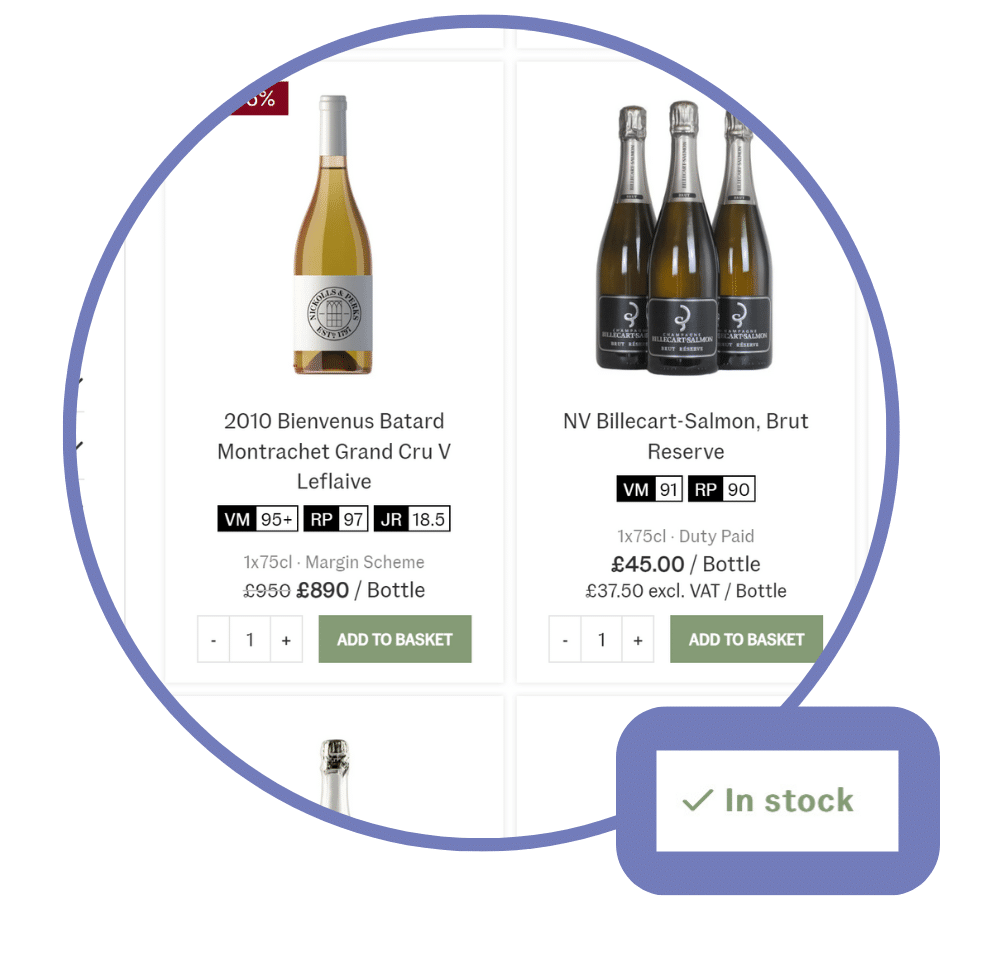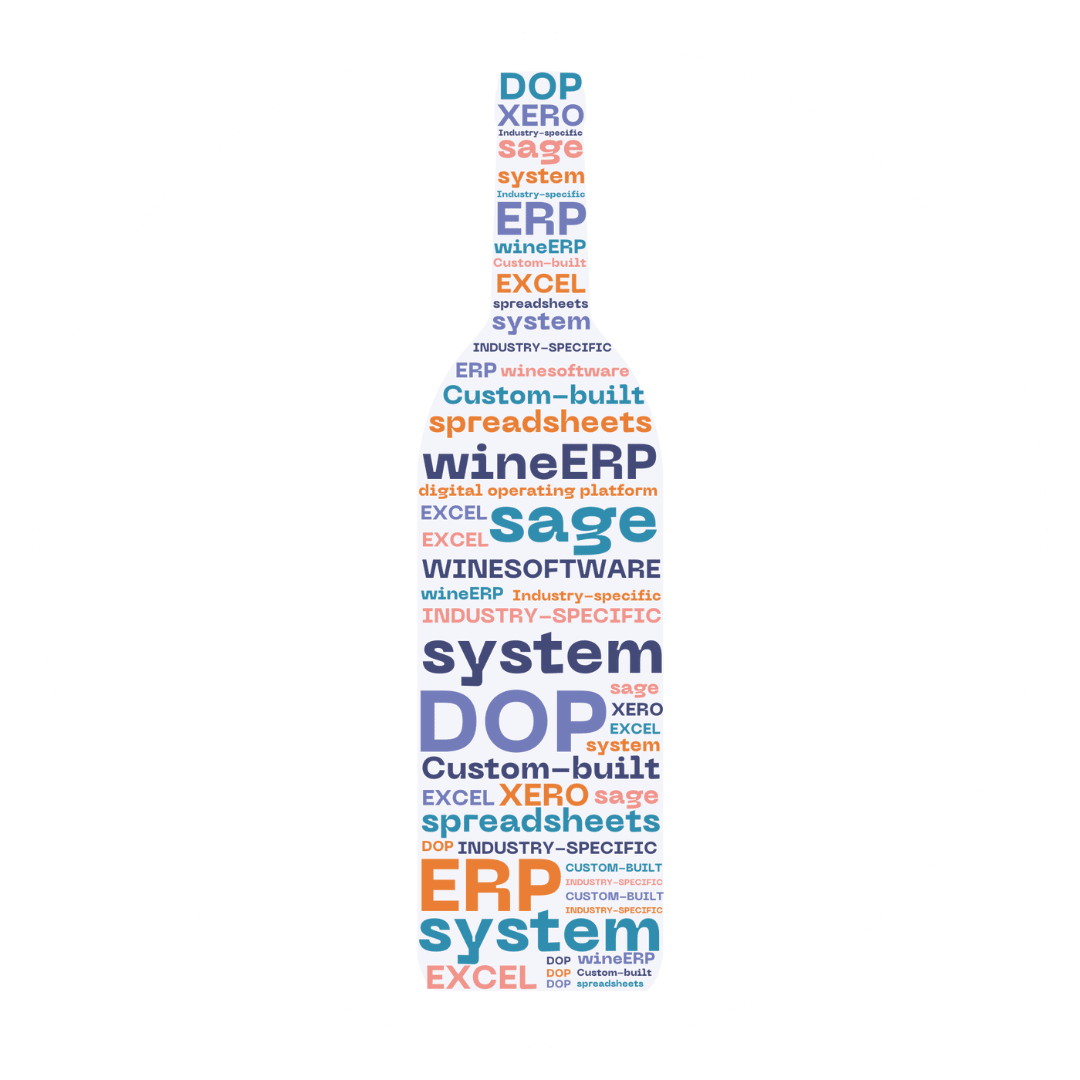Choosing Wine Industry Software

This guide will help you select the right wine industry software (for you), by navigating the range of options available to help run your wine business.
Relevant for retailers, merchants, importers, distributors and more, we explore your choices, what’s worked (and not worked) for others and what ROI (return on investment) you might expect from your new management system.
Also do access our free glossary HERE for software jargon.
Why is software important for a wine business?
Whether you are just starting up a wine business, or are an established company needing to operate more efficiently, or are anticipating a growth trajectory, technology plays a crucial role in your future.
The wine industry faces unique challenges with its non-conventional range of order processing workflows, which can be awkward for generic management software and accounting systems to handle effectively.
Quite simply, the right software supports operational efficiency, associated consistently excellent customer service and should offer the potential to open up paths to growth.
Inappropriately selected software more often than not hinders progress, frustrates teams and increases costs. For a deeper understanding of the financial implications of not having the right software, read our article ‘The impact of hidden costs on a wine business’.
Grab your FREE wine software audit checklist
Designed to help you identify and work through the selection criteria that are important for your business objectives, so you can shortlist and book demos with confidence.
Why not stick with spreadsheets and an accounting package?
Keying into spreadsheets, manual updating, colour-coding cells to differentiate stock on hand from pending arrivals or pending sales can work when operations are simple or small and when it’s just you. Nevertheless it’s important to consider accuracy, time spent and potential errors.
As turnover increases, manual entry becomes prone to mistakes that cost money and inevitably get trade partners and clients talking about you in unflattering terms. As how you do business gets a bit more involved, it’s difficult to manage pricing differences, track inventory, generate reliable reports or operate client wine storage.
The benefit of adopting wine business management software from the outset
Accounting systems such as Sage, Quickbooks or Xero are ubiquitous and brilliant for accounting. However they are not good inventory managers, and will struggle with quite basic industry-specific concepts such as alcohol duties, standardised product information (a must for reporting, managing overselling, reordering), differentiating products from wine entries, managing multiple stock locations, en primeur sales, virtual stock feeds. The limitations of spreadsheets manifest as incorrect or out of date information, costs of correcting errors and a patchy customer experience.
What is data mastering and why does it matter?
When it comes to selling through different sales channels, you need to centralise and manage all dynamic stock-related information (by which we mean all information, including product definitions and rich content) in one place. We refer to that as data mastering.
Your sales channels might include over the phone and email orders, eCommerce, a bricks and mortar shop, marketplaces like Vivino, fine wine exchanges such as Liv-ex and other digital sales channels (such as sharing your stock with other businesses).
Data mastering sounds boring and unnecessarily time-consuming but in practice it’s anything but. It means one system takes control of all your sales channels, orchestrates stock and product information, availability, determines channel pricing (should you wish to price differentially), tax and delivery options and immediately depletes your mastered position as bottles or cases sell through one channel and updates the stock positions through all other channels.
Trading and selling online across many channels or platforms means inventory management becomes critical. A high performance multi-channel selling approach allows you to trade with confidence knowing your stock positions are accurate and up-to-date.
For eCommerce specifically, there are many great software choices available, but consider the financial impact of running web sales from a separate stock position and workflows that needs managing separately. Contrast that with operating your online shop as a seamlessly integrated sales channel off a central, mastered inventory.


The ability to have real-time synchronisation is great and organising multi-channel selling from one platform has been working well for us.
Moving into the Cloud
The days of on-premise software are gone. Those who’ve not yet made the move may have put it off due to deep custom functionality built into on-prem that would have accumulated over time. SaaS (software as a service) can mean a complete migration to an entirely new platform, since on-prem and Cloud equivalent frameworks are typically totally different architectures. In house software teams will have become highly skilled looking after the legacy software and indispensable in applying patches or new releases, upgrading disks and managing firewalls.
However on-prem software will be approaching its end of life, sooner or later, so the question of moving to the Cloud has a certain inevitability to it.
On-prem may also be more prone to a Cyber attack, risking taking the business down for a period of time. Regrettably there are numerous examples where the in-house servers and team computers are not managed to Cyber Essentials or higher standards. Of course, they are rarely spoken about publicly.
Whilst high profile attacks can happen in the Cloud, SaaS platforms are subject to a security regime including ethical hacking and automated penetration testing, where any vulnerabilities apply to a single code base used by the entire installed base.
If you’re going to migrate from one to the other, it’s the obvious time to conduct a wider review of alternative ERP or equivalent applications and evaluate the different philosophies in approach.
Types of wine industry specific software
Custom Software
It can be tempting to view business opportunities from the perspective of what makes your business different compared to what it has in common with other operators in your sector. The most frequent misconception is that custom software will give you a competitive advantage. It won’t and never has. Executing on a great strategy can deliver a competitive advantage, the processes needed to support it (ie software) do not.
Let’s examine what happens when businesses build their own. All those ways in which your team has got used to working are pulled together into a wish list of what software needs to do in order to support ”the way we work”. Those get managed by a project manager and translated into business requirements that in turn become technical specifications. Building your own platform is challenging. It requires a lot of time, money and resources, which is tough for small to medium sized wine businesses whose expertise lies in wine, not software development. Custom development too easily becomes a money pit.
In the interests of balance, let’s say that the scale, complexity and distinctiveness of a business are such that custom development is a viable option. Justifiable business scale might kick in at turnover of around £200,000,000 and the business should have specialist technical in-house resource, as well as an appetite for a multi-year commitment of substantial ongoing project funding.

Everything under one roof
ERPs sell on this premise and typically consist of frameworks that are very broadly designed to be a starting point for any business. Big names in traditional ERP (enterprise resource planning), such as Oracle, Netsuite, Microsoft and SAP aim to manage the whole of business operations with an all-in-one system. Think of an ERP as a series of templates that need adaptation to work. That adaptation is typically undertaken by a software reseller who specialises in certain markets.
Think of an ERP offered via a reseller as workflows with rules and specific logic that sits on top of those frameworks and makes the generic work for the specific. Specific application solutions owned by the same software author form part of the overall package, encompassing accounting, marketing and business analysis, as examples.
The building blocks of software are designed and written by the author (e.g. Microsoft) whereas the reseller acts a bit like a building contractor, taking those building blocks and customising them or adding new features for a particular sector.
ERPs were the software of choice during the nineties and noughties when interoperability was hit and miss and it was tricky for databases to talk to one another.
With the advent of robust APIs in the last decade that do allow best in class applications to operate more or less seamlessly with each other, the usefulness of everything being under one roof is far less. Indeed the trade off of multiple applications subsisting under one roof or not tends to be how good those applications are, versus choosing best in class alternatives.
Paul Hammond, Co-founder of IG Wines, found, ‘We looked at some of the ERP systems from the larger companies, Microsoft etc, but the problem there is there’s no industry knowledge, so these people are building platforms for an industry that has high value, fragile cases that have been in the market for a long time and move everywhere and that’s very tricky and no offense, but these people aren’t in the industry, so that’s a disadvantage to them immediately.’
Stuart Dale, Founder of Crop & Vine comments, ‘It blew my mind the systems people had used, proprietary systems or systems that were off-the-shelf from big companies that have been moulded, tweaked and manipulated to do something for which they weren’t intended – so the headline might be great, but the reality is you change one thing then downstream everything changes and you need a constant monitoring system.’
The Wine Owners team investigated the Forrester article, which explores the end of ERP in favour of DOPs (digital operating platform), an interesting read for anyone exploring ERP solutions.
Software specifically for the wine industry
Industry specialist software refers to a platform that’s been designed from the ground up for a group of sectors or industry.
What makes software industry specific?
Database designs and workflows that are designed for all the use cases of an industry. For wine, it means being able to sell stock that’s not yet arrived, or not yet in bottle (en primeur) yet being able to show customers that those items form part of their relationship with you.
Customers can also be suppliers when it comes to consignment and the brokerage of their wines. That’s an alien concept to many ERP frameworks, but if that’s reflected in the industry specific software workflows it will save a lot of time.
ERPs positioned as industry specific still need to find a workaround to handle those concepts. One such platform demands a circuitous workflow to enable a client wine to be offered for sale: you first create a sales order, create a product code, add an extended code, sell to the consignor, then buy it back from them in order to add to client stored wines, then – and only then- can you broker it.
Industry specific software will have that workflow designed in, saving a great deal of time. In this example, the first step is to review market pricing and determine what it may sell for, offer for sale and enable a purchase order to be generated off a sales order. It should be made simple, helping team members to be efficient. Efficiency feeds into the consistency and effectiveness of workflows and has a positive cumulative effect on customer satisfaction.
Operational efficiency gains are much easier to achieve when software hasn’t been “designed for the generic with an eye to the specific”.
Industry perspectives
Hear what others in the industry have to say regarding industry-specific software.
Data is also a building block of industry specific software. Referential data saves time when creating orders, ensures that duplication is kept to a minimum that means mistakes are rarely made and that protects your bottom line from unnecessary costs associated with redeliveries, funding replacement stock or ex-gratia payments.
Consider inventory that a wine business wants to offer for sale that’s not stock on hand. We’ve already considered pending arrivals, which need to be recognised as yours and on your balance sheet, before you can sell them. What about the notion of virtual stock, being wines held by importers or merchants that you want to sell out of, even though it’s not your stock? A wine business, according to its stockholding strategy, may wish to offer hand-picked wines to their clients from that list, with a sales order preceding a purchase.
The list of specific workflows and activities within a sector as different as wine and spirits is substantial and can so much more easily be addressed if the building blocks are in place, which in turn makes all the difference for a wine business wanting to position themselves for future success.
Being industry specific also means understanding your business and the market context in depth. That feeds into a roadmap that is rather more than simply a functional response (important though that is). Figuring out the ways in which businesses can sell more and open up new sales channels supported by new or innovative operating models, is what software should help with. Where software enables this kind of industry dynamic, it will deliver a rapid return on investment.
Industry specific software should also save money by avoiding the costs of going the custom development route, assuming a business sees the benefit of everyone in the industry also benefitting. A rising tide floats all boats after all.
There are benefits to being industry specific, as explained by Forrester Research, so long as that can be integrated with best in class applications spanning accounting, CRM, business intelligence, point of sale and so on. Picking best in class applications brings more benefits compared to an alternative offered by your industry specific software that’s been written by them where there is no industry specific benefit in doing so.
Competitive advantage
Can software deliver a competitive advantage?
That’s a mistaken assumption that software will transform your business, advocated no doubt by software providers and resellers. On its own, it’s unlikely. Competitive advantage is achieved by the implementation of business strategy or a market approach that’s distinctive and sustainable. Technology can help you be much more efficient and systematic about how you go about the execution of a plan. However, where a technology enables industry-level collaboration, or time savings that help to lower costs and improve net profit, or helps accelerate a strategy – and a business implements a less productive choice – that can result in a competitive disadvantage, causing loss of actual or potential market share.
Grab your FREE wine software audit checklist
Designed to help you identify and work through the selection criteria that are important for your business objectives, so you can shortlist and book demos with confidence.

‘We were paying for WineSuite, we were also keeping manual ledgers, we had a separate finance package, so in total we had four different pieces of software running because we couldn’t trust the data. For a small business it was a nightmare and the staff didn’t have faith in the software. Moving to Wine Hub has been a very seamless process and confidence in the software and the data that it has provided is now allowing us to get rid of all the extra unnecessary pieces of software. The fact the APIs talk to Xero means we’ve almost removed all of the manual entry points that we had previously.’
To read more about how industry-specific software could help your wine business read our article, What is industry-specific software and why does it matter?
A Software Partner
Choosing the right software partner is of critical importance. Selecting an ERP or digital operating platform – the software that runs your business and needs to handle all order processing and orchestrates all sales channels – is a long-term decision. The average time that a wine business stays on the same core system is 8-10 years.
Therefore you should undertake due diligence at the company level.
How long has the company existed, what is its legal status, is the company a going concern?
How many clients does it have in your jurisdiction and have you explored case studies or reached out to existing customers to get feedback.
To what extent is the platform requiring customisation and if so how supportable is that customisation long-term? If needed, conduct a proof of concept to test the system’s effectiveness and user experience.
Understand the supplier’s implementation methodology, available training resources, and knowledge transfer plans. Evaluate post-implementation support, service levels and their track record for updates.
Take a view on the durability of the tech stack and ease with which it is supportable long-term. It is desirable to be on a modern SaaS platform. It is nevertheless better to know you are on tried and tested technologies for which there are plentiful technical resources rather than a cutting edge technology that is currently in vogue but may not be so in the future, with the implications around future technical resource availability that comes with.
As part of this evaluation, form a view as to how business-centric the supplier is. Technical capability does not equate to best-in-class design decisions. The effectiveness of the software in improving operations and the commercial success of the business has very little to do with technologies utilised.
Review the vendor’s commitments to response times, support services and uptime guarantees. Ensure the ERP provider complies with industry-specific standards and data security measures.
How integrated is the platform provider into the industry infrastructure?
Determine how well resourced and structured the supplier is for the initial onboarding and the ongoing management of your account. Skill sets required for development are very different to data management and data migration, which in turn are different to implementation and onboarding on the one hand and ongoing support on the other. How your team feels supported and how responsive the support provision is, is critical for the success of the platform and the value it brings to your business.
How likely is a medium to longer term roadmap to be executed, which is a function of the organisation’s ability manage customer growth and the scale and breadth of its customer base, since an effective industry-specific roadmap ought to be be market-led.

When I researched, I really wanted a system that was great at the moment, but had the possibility of evolving as well – a business that was listening to the customers and reacting to our demands.